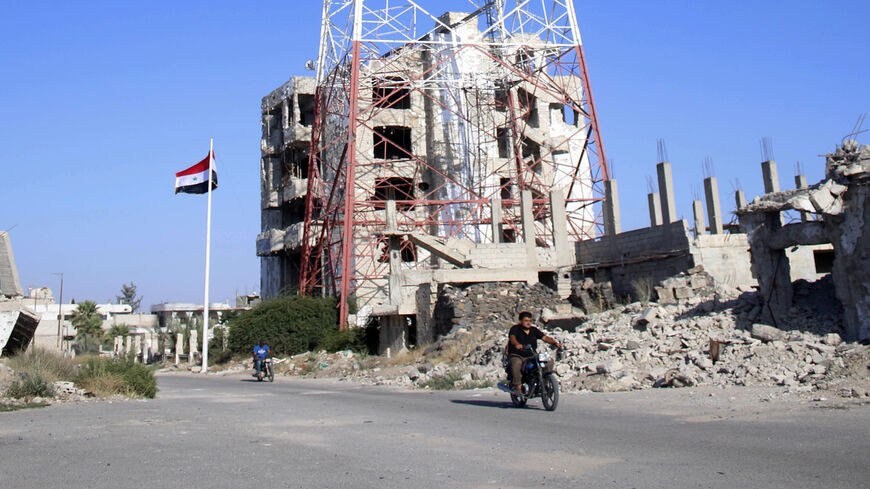
With the support of Russia, Syrian government forces are besieging 11,000 Syrian families in the neighborhoods of Daraa al-Balad in southern Syria, after former Free Syrian Army fighters refused to hand over their light weapons.
Daraa al-Balad markets in Syria’s southern province of Daraa are witnessing a shortage in various basic materials and commodities, including medicines, fuel, bread and drinking water, while prices of goods have significantly increased, amid an almost complete power outage due to the siege imposed by the Syrian government in mid-June.
On June 24, the government forces began to impose their siege on the neighborhoods of Daraa al-Balad, by closing the roads linking these neighborhoods to Daraa city, after the residents refused the Russian military police’s demand to hand over 200 small individual weapons, in addition to 20 BKC automatic machine guns.
In a June 27 statement, the Central Committee in Daraa province — formed by the opposition to negotiate with the government — accused Russia of abandoning its role as a guarantor of the 2018 settlement agreement reached in southern Syria between the Syrian opposition and the government and pressuring the residents. It said that Russian Gen. Assad Allah used all methods of siege and intimidation, threatening to bring in reinforcements from the Iranian militias and sending warplanes to sow terror among children, women and the elderly.
The government forces took control of the Daraa governorate in July 2018 and imposed a settlement with Russian sponsorship. The terms of the settlement agreement included handing over heavy and medium weapons owned by the Free Syrian Army factions in Daraa to the government. It seems that the government, with the support of Russia, wants to amend the terms of the settlement and get ahold of light weapons as well.
Adnan Masalmeh, a member of the Central Committee in Daraa, said in a June 26 Facebook post, “Closing the crossings and imposing a siege are war crimes punishable by international law. The insubstantial arguments used by the Russians aim to damage the stability that our local community has accomplished and maintained.”
Sheikh Faisal Abazid, another member of the Central Committee, said in his Friday sermon June 25 that the regime is working to create crises in Daraa in order to evade the implementation of the settlement provisions.
On July 2, local activists organized a sit-in in the besieged neighborhoods of Daraa al-Balad to protest against the siege.
The government forces deny that they are besieging Daraa al-Balad. The head of the government’s Reconciliation Committee in Daraa, Hussein al-Rifai, said during a June 26 interview with the government’s local radio station Sham FM that Daraa is not subject to any kind of siege, noting that the government is only correcting previous settlements, which were not fair.
On July 6, Rifai told the local newspaper Al-Watan, “The decision to hand over weapons and complete the settlements has been taken and is irreversible.”
In this context, Rabih Abu Nabout, an activist from Daraa al-Balad, told Al-Monitor, “The regime forces imposed a stifling siege on the neighborhoods of Daraa al-Balad and isolated them from their entire surroundings. There is only one road with a regime checkpoint that prevents people from crossing, and the regime’s military security in charge there shoots at those who try to approach.”
He added, “The siege is very difficult, as the regime’s checkpoints prevent students from going to the university to take their exams and employees can’t make it to their workplaces.”
Abu Nabout noted, “The cruelest thing under the siege is the lack of medicine. There is only one health center serving the neighborhoods of Daraa al-Balad, and it provides medical services to over 11,000 besieged families. It is always overcrowded with patients, especially the elderly and children. We find it difficult to secure medicines for patients with chronic diseases, and there are no medicines for those with cancer and no medical equipment for kidney dialysis. We lack sufficient health care for pregnant women and there are no incubators for premature babies.”
Journalist Omar al-Horani told Al-Monitor, “The residents of Daraa al-Balad used to shop for foodstuffs, vegetables and fruits from the markets in Daraa city, but can no longer reach them due to the siege. The prices of available food commodities, such as bread and sugar, significantly increased. We also fear a health disaster amid the [coronavirus] pandemic. If the siege were to continue, I expect a humanitarian catastrophe that will leave an impact on 11,000 families suffering under lack of sources of income and unemployment.”
A resident of one of the besieged neighborhoods of Daraa al-Balad told Al-Monitor on condition of anonymity, “The prices of foodstuffs and goods have doubled under the siege. The price of a liter [0.3 gallons] of gasoline has risen to 3,500 Syrian pounds [$1] — a hike of 1,000 Syrian pounds over the price officially set by the government in April, which is 2,500 Syrian pounds [$0.70].”
He added, “Drinking water used to reach our homes before the siege twice a week for a period of six hours, but we now get drinking water once every eight days, and for a short period only. We are unable to store sufficient quantities of water. In addition, electricity is almost completely cut off from the neighborhoods of Daraa al-Balad. We are subjected to collective punishment. If this continues for a longer period, many food commodities, infant formula and the medicines we still have will be completely exhausted.”
He concluded, “Several patients tried to get out — including women and the elderly — but the regime’s checkpoints prevented them from crossing. Over 50,000 people are now under siege.”
